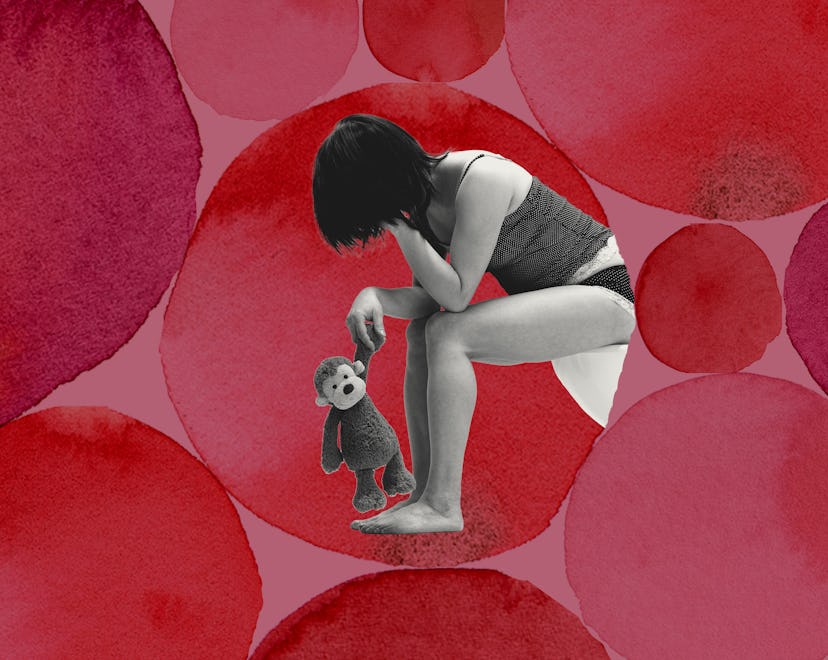Aunt Flo Is Back

How Your Period Changes Postpartum
And that pesky PMS.
One very nice perk of pregnancy: no period. I mean, sure, you’re dealing with a lot of other uncomfortable things, but not having to buy tampons for at least 9 months? Being able to wear whatever you want without fear that Aunt Flo’s gonna make her presence known? (I mean, now you’re just worried you might pee a little from a ninja kick inside your uterus, but it’s all fine.) It’s pretty great. Until that period comes back after pregnancy. I mean, the really amazing thing about your body is that once you give birth, it starts prepping itself to get pregnant all over again. Dr. Melanie Altizer, Chief of OB-GYN at St. Mary’s Medical Center in West Palm Beach, Florida, tells Romper that, in general, periods return in the first three months after pregnancy. (Unfair, I think.) But even if you’re expecting it or semi-prepared, your period may feel different after pregnancy, and knowing how and why your period changes postpartum can help you cope a bit. (Like you didn’t have enough going on, right?)
Do periods change postpartum?
You probably expected your hormones to get a little rattled once you entered the postpartum stage of things, but your periods can also change because your body has physically changed. Altizer tells Romper that some people may find their periods get easier (less cramping, less bleeding) after pregnancy, while others may find that they get more difficult with heavier, longer, or more painful periods. “The uterine cavity can become enlarged after pregnancy, which can lead to more endometrium shedding,” she says. But for some, “the uterus being enlarged and more relaxed results in light or no periods at all. For those with certain conditions, such as severe endometriosis, painful bleeding after pregnancy is sometimes improved.”
If you go on birth control after delivery, Altizer says that can impact your period, too. Especially if you weren’t on birth control before. “Usually, hormones and the physical changes that occur in the uterus itself after birth contribute to period change.”
How does PMS change after pregnancy?
Now those hormones are already going wild after having a baby, but then you add in a period and hoo boy. It can really feel like a whole lot happening. But Altizer says any PMS shifts after having a baby aren’t really affected by your postpartum hormones. “Postpartum hormones are not PMS related, but in that time right after pregnancy, women are prone to labile/shifting emotions,” she says. “It can be a rollercoaster of emotions. Not every patient experiences this. It’s part of the process of your body returning to normal.”
If you find yourself feeling weepier than usual or even experiencing flashes of rage around the time of your period — feelings you may not have had pre-baby — it’s worth talking to your doctor. Your hormones are definitely going to change after having a baby, and postpartum depression and/or baby blues can make everything feel different. “If someone feels a little irritable/teary eyed here and there, it’s normal,” Altizer says. “But if it gets to the point that it’s difficult to get out of bed or difficulty finding motivation to take care of the baby or yourself, or you have thoughts of hurting the baby/yourself, seek help right away. If you’re not sure, always go ask your provider.”
Do postpartum period changes affect future cycles for TTC?
“Postpartum period changes should not affect future cycles for trying to conceive,” Altizer says. “This only occurs if a patient does not resume normal ovulation. In this instance, it’s important to speak with a healthcare professional about what might be causing an irregular period, especially if one’s period was regular prior to pregnancy.”
But Altizer wants postpartum people to know that without being on birth control, it’s possible to start ovulating just 21 days after birth, which means a pregnancy could happen. You should work with your healthcare provider to develop a safe plan for conceiving again after delivery or avoiding pregnancy.
Should you be concerned about a different period after pregnancy?
While there may be more bleeding or more painful cramps, Altizer says there’s usually no cause for concern. “If a patient experienced regular periods prior to pregnancy, their regular periods may resume and stabilize within a few months.”
But Altizer also advises that if something has changed for the worse — even though it may not be because of something serious — you should let your OB-GYN know. Extreme period pain or a heavy flow that impacts you living your normal life shouldn’t be ignored, and your healthcare provider may have answers for you.
Your first period post-birth is going to feel different — several of those postpartum periods might. They can be irregular, they can be more painful, they can have less bleeding — but all of it really is normal for the most part. Just take it day by day.
Expert:
Dr. Melanie Altizer, Chief of OB-GYN St. Mary’s Medical Center
This article was originally published on